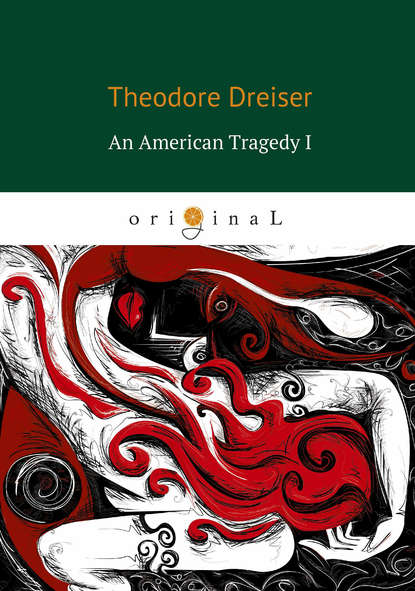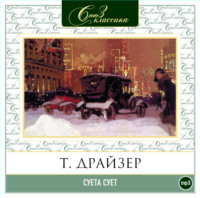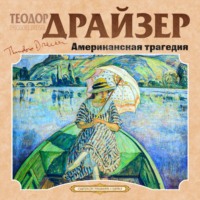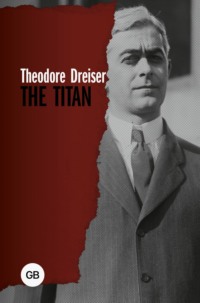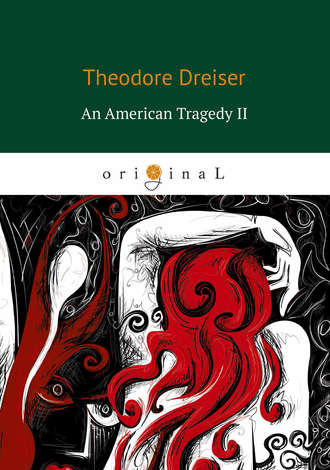
Полная версия
An American Tragedy II
“Yes, the preacher. At least I understand he was for a while after he left home. But his son tells me he has given that up now. He’s connected with something in Denver – a hotel, I think.”
“But what’s his son like?” interrogated Bella, who only knew such well groomed and ostensibly conservative youths and men as her present social status and supervision permitted, and in consequence was intensely interested. The son of a western hotel proprietor!
“A cousin? How old is he?” asked Gilbert instantly, curious as to his character and situation and ability.
“Well, he’s a very interesting young man, I think,” continued Griffiths tentatively and somewhat dubiously, since up to this hour he had not truly made up his mind about Clyde. “He’s quite good-looking and well-mannered, too – about your own age, I should say, Gil, and looks a lot like you – very much so – same eyes and mouth and chin.” He looked at his son examiningly. “He’s a little bit taller, if anything, and looks a little thinner, though I don’t believe he really is.”
At the thought of a cousin who looked like him – possibly as attractive in every way as himself – and bearing his own name, Gilbert chilled and bristled slightly. For here in Lycurgus, up to this time, he was well and favourably known as the only son and heir presumptive to the managerial control of his father’s business, and to at least a third of the estate, if not more. And now, if by any chance it should come to light that there was a relative, a cousin of his own years and one who looked and acted like him, even – he bridled at the thought. Forthwith (a psychic reaction which he did not understand and could not very well control) he decided that he did not like him – could not like him.
“What’s he doing now?” he asked in a curt and rather sour tone, though he attempted to avoid the latter element in his voice.
“Well, he hasn’t much of a job, I must say,” smiled Samuel Griffiths, meditatively. “He’s only a bell-hop in the Union League Club in Chicago, at present, but a very pleasant and gentlemanly sort of a boy, I will say. I was quite taken with him. In fact, because he told me there wasn’t much opportunity for advancement where he was, and that he would like to get into something where there was more chance to do something and be somebody, I told him that if he wanted to come on here and try his luck with us, we might do a little something for him – give him a chance to show what he could do, at least.”
He had not intended to set forth at once the fact that he became interested in his nephew to this extent, but – rather to wait and thrash it out at different times with both his wife and son, but the occasion having seemed to offer itself, he had spoken. And now that he had, he felt rather glad of it, for because Clyde so much resembled Gilbert he did want to do a little something for him.
But Gilbert bristled and chilled, the while Bella and Myra, if not Mrs. Griffiths, who favored her only son in everything – even to preferring him to be without a blood relation or other rival of any kind, rather warmed to the idea. A cousin who was a Griffiths and good-looking and about Gilbert’s age – and who, as their father reported, was rather pleasant and well-mannered – that pleased Bella and Myra while Mrs. Griffiths, noting Gilbert’s face darken, was not so moved. He would not like him. But out of respect for her husband’s authority and general ability in all things, she now remained silent. But not so, Bella.
“Oh, you’re going to give him a place, are you, Dad?” she commented. “That’s interesting. I hope he’s better-looking than the rest of our cousins.”
“Bella,” chided Mrs. Griffiths, while Myra, recalling a gauche uncle and cousin who had come on from Vermont several years before to visit them a few days, smiled wisely. At the same time Gilbert, deeply irritated, was mentally fighting against the idea. He could not see it at all. “Of course we’re not turning away applicants who want to come in and learn the business right along now, as it is,” he said sharply.
“Oh, I know,” replied his father, “but not cousins and nephews exactly. Besides he looks very intelligent and ambitious to me. It wouldn’t do any great harm if we let at least one of our relatives come here and show what he can do. I can’t see why we shouldn’t employ him as well as another.”
“I don’t believe Gil likes the idea of any other fellow in Lycurgus having the same name and looking like him,” suggested Bella, slyly, and with a certain touch of malice due to the fact that her brother was always criticizing her.
“Oh, what rot!” Gilbert snapped irritably. “Why don’t you make a sensible remark once in a while? What do I care whether he has the same name or not – or looks like me, either?” His expression at the moment was particularly sour.
“Gilbert!” pleaded his mother, reprovingly. “How can you talk so? And to your sister, too?”
“Well, I don’t want to do anything in connection with this young man if it’s going to cause any hard feelings here,” went on Griffiths senior. “All I know is that his father was never very practical and I doubt if Clyde has ever had a real chance.” (His son winced at this friendly and familiar use of his cousin’s first name.) “My only idea in bringing him on here was to give him a start. I haven’t the faintest idea whether he would make good or not. He might and again he might not. If he didn’t – ” He threw up one hand as much as to say, “If he doesn’t, we will have to toss him aside, of course.”
“Well, I think that’s very kind of you, father,” observed Mrs. Griffiths, pleasantly and diplomatically. “I hope he proves satisfactory.”
“And there’s another thing,” added Griffiths wisely and sententiously. “I don’t expect this young man, so long as he is in my employ and just because he’s a nephew of mine, to be treated differently to any other employee in the factory. He’s coming here to work – not play. And while he is here, trying, I don’t expect any of you to pay him any social attention – not the slightest. He’s not the sort of boy anyhow, that would want to put himself on us – at least he didn’t impress me that way, and he wouldn’t be coming down here with any notion that he was to be placed on an equal footing with any of us. That would be silly. Later on, if he proves that he is really worth while, able to take care of himself, knows his place and keeps it, and any of you wanted to show him any little attention, well, then it will be time enough to see, but not before then.”
By then, the maid, Amanda, assistant to Mrs. Truesdale, was taking away the dinner plates and preparing to serve the dessert. But as Mr. Griffiths rarely ate dessert, and usually chose this period, unless company was present, to look after certain stock and banking matters which he kept in a small desk in the library, he now pushed back his chair, arose, excusing himself to his family, and walked into the library adjoining. The others remained.
“I would like to see what he’s like, wouldn’t you?” Myra asked her mother.
“Yes. And I do hope he measures up to all of your father’s expectations. He will not feel right if he doesn’t.”
“I can’t get this,” observed Gilbert, “bringing people on now when we can hardly take care of those we have. And besides, imagine what the bunch around here will say if they find out that our cousin was only a bell-hop before coming here!”
“Oh, well, they won’t have to know that, will they?” said Myra.
“Oh, won’t they? Well, what’s to prevent him from speaking about it – unless we tell him not to – or some one coming along who has seen him there.” His eyes snapped viciously. “At any rate, I hope he doesn’t. It certainly wouldn’t do us any good around here.”
And Bella added, “I hope he’s not dull as Uncle Allen’s two boys. They’re the most uninteresting boys I ever did see.”
“Bella,” cautioned her mother once more.
Chapter 3
The Clyde whom Samuel Griffiths described as having met at the Union League Club in Chicago, was a somewhat modified version of the one who had fled from Kansas City three years before. He was now twenty, a little taller and more firmly but scarcely any more robustly built, and considerably more experienced, of course. For since leaving his home and work in Kansas City and coming in contact with some rough usage in the world – humble tasks, wretched rooms, no intimates to speak of, plus the compulsion to make his own way as best he might – he had developed a kind of self-reliance and smoothness of address such as one would scarcely have credited him with three years before. There was about him now, although he was not nearly so smartly dressed as when he left Kansas City, a kind of conscious gentility of manner which pleased, even though it did not at first arrest attention. Also, and this was considerably different from the Clyde who had crept away from Kansas City in a box car, he had much more of an air of caution and reserve.
For ever since he had fled from Kansas City, and by one humble device and another forced to make his way, he had been coming to the conclusion that on himself alone depended his future. His family, as he now definitely sensed, could do nothing for him. They were too impractical and too poor – his mother, father, Esta, all of them.
At the same time, in spite of all their difficulties, he could not now help but feel drawn to them, his mother in particular, and the old home life that had surrounded him as a boy – his brother and sisters, Esta included, since she, too, as he now saw it, had been brought no lower than he by circumstances over which she probably had no more control. And often, his thoughts and mood had gone back with a definite and disconcerting pang because of the way in which he had treated his mother as well as the way in which his career in Kansas City had been suddenly interrupted – his loss of Hortense Briggs – a severe blow; the troubles that had come to him since; the trouble that must have come to his mother and Esta because of him.
On reaching St. Louis two days later after his flight, and after having been most painfully bundled out into the snow a hundred miles from Kansas City in the gray of a winter morning, and at the same time relieved of his watch and overcoat by two brakemen who had found him hiding in the car, he had picked up a Kansas City paper – The Star – only to realize that his worst fear in regard to all that had occurred had come true. For there, under a two-column head, and with fully a column and a half of reading matter below, was the full story of all that had happened: a little girl, the eleven-year-old daughter of a well-to-do Kansas City family, knocked down and almost instantly killed – she had died an hour later; Sparser and Miss Sipe in a hospital and under arrest at the same time, guarded by a policeman sitting in the hospital awaiting their recovery; a splendid car very seriously damaged; Sparser’s father, in the absence of the owner of the car for whom he worked, at once incensed and made terribly unhappy by the folly and seeming criminality and recklessness of his son.
But what was worse, the unfortunate Sparser had already been charged with larceny and homicide, and wishing, no doubt, to minimize his own share in this grave catastrophe, had not only revealed the names of all who were with him in the car – the youths in particular and their hotel address – but had charged that they along with him were equally guilty, since they had urged him to make speed at the time and against his will – a claim which was true enough, as Clyde knew. And Mr. Squires, on being interviewed at the hotel, had furnished the police and the newspapers with the names of their parents and their home addresses.
This last was the sharpest blow of all. For there followed disturbing pictures of how their respective parents or relatives had taken it on being informed of their sins. Mrs. Ratterer, Tom’s mother, had cried and declared her boy was a good boy, and had not meant to do any harm, she was sure. And Mrs. Hegglund – Oscar’s devoted but aged mother – had said that there was not a more honest or generous soul and that he must have been drinking. And at his own home – The Star had described his mother as standing, pale, very startled and very distressed, clasping and unclasping her hands and looking as though she were scarcely able to grasp what was meant, unwilling to believe that her son had been one of the party and assuring all that he would most certainly return soon and explain all, and that there must be some mistake.
However, he had not returned. Nor had he heard anything more after that. For, owing to his fear of the police, as well as of his mother – her sorrowful, hopeless eyes, he had not written for months, and then a letter to his mother only to say that he was well and that she must not worry. He gave neither name nor address. Later, after that he had wandered on, essaying one small job and another, in St. Louis, Peoria, Chicago, Milwaukee – dishwashing in a restaurant, soda-clerking in a small outlying drug-store, attempting to learn to be a shoe clerk, a grocer’s clerk, and what not; and being discharged and laid off and quitting because he did not like it. He had sent her ten dollars once – another time five, having, as he felt, that much to spare. After nearly a year and a half he had decided that the search must have lessened, his own part in the crime being forgotten, possibly, or by then not deemed sufficiently important to pursue – and when he was once more making a moderate living as the driver of a delivery wagon in Chicago, a job that paid him fifteen dollars a week, he resolved that he would write his mother, because now he could say that he had a decent place and had conducted himself respectably for a long time, although not under his own name.
And so at that time, living in a hall bedroom on the West Side of Chicago – Paulina Street – he had written his mother the following letter:
DEAR MOTHER:
Are you still in Kansas City? I wish you would write and tell me. I would so like to hear from you again and to write you again, too, if you really want me to. Honestly I do, Ma. I have been so lonely here. Only be careful and don’t let any one know where I am yet. It won’t do any good and might do a lot of harm just when I am trying so hard to get a start again. I didn’t do anything wrong that time, myself. Really I didn’t, although the papers said so – just went along. But I was afraid they would punish me for something that I didn’t do. I just couldn’t come back then. I wasn’t to blame and then I was afraid of what you and father might think. But they invited me, Ma. I didn’t tell him to go any faster or to take that car like he said. He took it himself and invited me and the others to go along. Maybe we were all to blame for running down that little girl, but we didn’t mean to. None of us. And I have been so terribly sorry ever since. Think of all the trouble I have caused you! And just at the time when you most needed me. Gee! Mother, I hope you can forgive me. Can you?
I keep wondering how you are. And Esta and Julia and Frank and Father. I wish I knew where you are and what you are doing. You know how I feel about you, don’t you, Ma? I’ve got a lot more sense now, anyhow, I see things different than I used to. I want to do something in this world. I want to be successful. I have only a fair place now, not as good as I had in K. C., but fair, and not in the same line. But I want something better, though I don’t want to go back in the hotel business either if I can help it. It’s not so very good for a young man like me – too high-flying, I guess. You see I know a lot more than I did back there. They like me all right where I am, but I got to get on in this world. Besides I am not really making more than my expenses here now, just my room and board and clothes but I am trying to save a little in order to get into some line where I can work up and learn something. A person has to have a line of some kind these days. I see that now.
Won’t you write me and tell me how you all are and what you are doing? I’d like to know. Give my love to Frank and Julia and Father and Esta, if they are all still there. I love you just the same and I guess you care for me a little, anyhow, don’t you? I won’t sign my real name, because it may be dangerous yet (I haven’t been using it since I left K. C.) But I’ll give you my other one, which I’m going to leave off pretty soon and take up my old one. Wish I could do it now, but I’m afraid to yet. You can address me, if you will, as
HARRY TENET,
General Delivery, Chicago
I’ll call for it in a few days. I sign this way so as not to cause you or me any more trouble, see? But as soon as I feel more sure that this other thing has blown over, I’ll use my own name again sure.
Lovingly,
YOUR SON.
He drew a line where his real name should be and underneath wrote “you know” and mailed the letter.
Following that, because his mother had been anxious about him all this time and wondering where he was, he soon received a letter, postmarked Denver, which surprised him very much, for he had expected to hear from her as still in Kansas City.
DEAR SON:
I was surprised and so glad to get my boy’s letter and to know that you were alive and safe. I had hoped and prayed that you would return to the straight and narrow path – the only path that will ever lead you to success and happiness of any kind, and that God would let me hear from you as safe and well and working somewhere and doing well. And now he has rewarded my prayers. I knew he would. Blessed be His holy name.
Not that I blame you altogether for all that terrible trouble you got into and bringing so much suffering and disgrace on yourself and us – for well I know how the devil tempts and pursues all of us mortals and particularly just such a child as you. Oh, my son, if you only knew how you must be on your guard to avoid these pitfalls. And you have such a long road ahead of you. Will you be ever watchful and try always to cling to the teachings of our Saviour that your mother has always tried to impress upon the minds and hearts of all you dear children? Will you stop and listen to the voice of our Lord that is ever with us, guiding our footsteps safely up the rocky path that leads to a heaven more beautiful than we can ever imagine here? Promise me, my child, that you will hold fast to all your early teachings and always bear in mind that “right is might,” and my boy, never, never, take a drink of any kind no matter who offers it to you. There is where the devil reigns in all his glory and is ever ready to triumph over the weak one. Remember always what I have told you so often “Strong drink is raging and wine is a mocker,” and it is my earnest prayer that these words will ring in your ears every time you are tempted – for I am sure now that that was perhaps the real cause of that terrible accident.
I suffered terribly over that, Clyde, and just at the time when I had such a dreadful ordeal to face with Esta. I almost lost her. She had such an awful time. The poor child paid dearly for her sin. We had to go in debt so deep and it took so long to work it out – but finally we did and now things are not as bad as they were, quite.
As you see, we are now in Denver. We have a mission of our own here now with housing quarters for all of us. Besides we have a few rooms to rent which Esta, and you know she is now Mrs. Nixon, of course, takes care of. She has a fine little boy who reminds your father and me of you so much when you were a baby. He does little things that are you all over again so many times that we almost feel that you are with us again – as you were. It is comforting, too, sometimes.
Frank and Julie have grown so and are quite a help to me. Frank has a paper route and earns a little money which helps. Esta wants to keep them in school just as long as we can.
Your father is not very well, but of course, he is getting older, and he does the best he can.
I am awful glad, Clyde, that you are trying so hard to better yourself in every way and last night your father was saying again that your uncle, Samuel Griffiths, of Lycurgus, is so rich and successful and I thought that maybe if you wrote him and asked him to give you something there so that you could learn the business, perhaps he would. I don’t see why he wouldn’t. After all you are his nephew. You know he has a great collar business there in Lycurgus and he is very rich, so they say. Why don’t you write him and see? Somehow I feel that perhaps he would find a place for you and then you would have something sure to work for. Let me know if you do and what he says.
I want to hear from you often, Clyde. Please write and let us know all about you and how you are getting along. Won’t you? Of course we love you as much as ever, and will do our best always to try to guide you right. We want you to succeed more than you know, but we also want you to be a good boy, and live a clean, righteous life, for, my son, what matter it if a man gaineth the whole world and loseth his own soul?
Write your mother, Clyde, and bear in mind that her love is always with you – guiding you – pleading with you to do right in the name of the Lord.
Affectionately,
MOTHER.
And so it was that Clyde had begun to think of his uncle Samuel and his great business long before he encountered him. He had also experienced an enormous relief in learning that his parents were no longer in the same financial difficulties they were when he left, and safely housed in a hotel, or at least a lodging house, probably connected with this new mission.
Then two months after he had received his mother’s first letter and while he was deciding almost every day that he must do something, and that forthwith, he chanced one day to deliver to the Union League Club on Jackson Boulevard a package of ties and handkerchiefs which some visitor to Chicago had purchased at the store, for which he worked. Upon entering, who should he come in contact with but Ratterer in the uniform of a club employee. He was in charge of inquiry and packages at the door. Although neither he nor Ratterer quite grasped immediately the fact that they were confronting one another again, after a moment Ratterer had exclaimed: “Clyde!” And then seizing him by an arm, he added enthusiastically and yet cautiously in a very low tone: “Well, of all things! The devil! Whaddya know? Put ‘er there. Where do you come from anyhow?” And Clyde, equally excited, exclaimed, “Well, by jing, if it ain’t Tom. Whaddya know? You working here?”
Ratterer, who (like Clyde) had for the moment quite forgotten the troublesome secret which lay between them, added: “That’s right. Surest thing you know. Been here for nearly a year, now.” Then with a sudden pull at Clyde’s arm, as much as to say, “Silence!” he drew Clyde to one side, out of the hearing of the youth to whom he had been talking as Clyde came in, and added: “Ssh! I’m working here under my own name, but I’d rather not let ’em know I’m from K. C., see. I’m supposed to be from Cleveland.”
And with that he once more pressed Clyde’s arm genially and looked him over. And Clyde, equally moved, added: “Sure. That’s all right. I’m glad you were able to connect. My name’s Tenet, Harry Tenet. Don’t forget that.” And both were radiantly happy because of old times’ sake.
But Ratterer, noticing Clyde’s delivery uniform, observed: “Driving a delivery, eh? Gee, that’s funny. You driving a delivery. Imagine. That kills me. What do you want to do that for?” Then seeing from Clyde’s expression that his reference to his present position might not be the most pleasing thing in the world, since Clyde at once observed: “Well, I’ve been up against it, sorta,” he added: “But say, I want to see you. Where are you living?” (Clyde told him.) “That’s all right. I get off here at six. Why not drop around after you’re through work. Or, I’ll tell you – suppose we meet at – well, how about Henrici’s on Randolph Street? Is that all right? At seven, say. I get off at six and I can be over there by then if you can.”
Clyde, who was happy to the point of ecstasy in meeting Ratterer again, nodded a cheerful assent.
He boarded his wagon and continued his deliveries, yet for the rest of the afternoon his mind was on this approaching meeting with Ratterer. And at five-thirty he hurried to his barn and then to his boarding house on the west side, where he donned his street clothes, then hastened to Henrici’s. He had not been standing on the corner a minute before Ratterer appeared, very genial and friendly and dressed, if anything, more neatly than ever.


